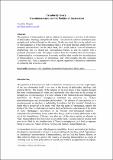Files in this item
Creaturely glory : transimmanence and the politics of incarnation
Item metadata
| dc.contributor.author | Paipais, Vassilios | |
| dc.date.accessioned | 2022-07-20T23:34:52Z | |
| dc.date.available | 2022-07-20T23:34:52Z | |
| dc.date.issued | 2022-05-21 | |
| dc.identifier | 272708270 | |
| dc.identifier | e41e86fc-0999-4557-a0ef-262a84c20ed0 | |
| dc.identifier | 85099758619 | |
| dc.identifier | 000609587800001 | |
| dc.identifier.citation | Paipais , V 2022 , ' Creaturely glory : transimmanence and the politics of incarnation ' , Political Theology , vol. 23 , no. 3 , pp. 184-200 . https://doi.org/10.1080/1462317X.2021.1872919 | en |
| dc.identifier.issn | 1462-317X | |
| dc.identifier.other | RIS: urn:D9E9A3C85FE5115472502233DF17A8F2 | |
| dc.identifier.other | ORCID: /0000-0001-5564-3597/work/88268329 | |
| dc.identifier.uri | https://hdl.handle.net/10023/25675 | |
| dc.description.abstract | The question of transcendence and its relation to immanence is not new in the history of philosophy, theology, and political theory. Two positions seem to demarcate post-metaphysical political thought on this issue. On the one hand, there is the radical view of transcendence, a hyper-transcendence that is ever more beyond, unalloyed by any mundane thematization. On the other hand, there is the radical view of immanence emphasizing that we should put transcendence behind us and be content with a profaned immanent world. This paper explores how the Christian idea of incarnation, if approached as a transimmanent hypostatic modality that reveals how the radicalism of transcendence is realized in immanence, may offer insights into the syntagma creaturely life. Such a perspective is set against Agamben's alternative elaboration of creaturely life as form-of-life. | |
| dc.format.extent | 17 | |
| dc.format.extent | 487421 | |
| dc.language.iso | eng | |
| dc.relation.ispartof | Political Theology | en |
| dc.subject | Creaturely life | en |
| dc.subject | Agamben | en |
| dc.subject | Incarnation | en |
| dc.subject | Hypostasis | en |
| dc.subject | Flesh | en |
| dc.subject | Glory | en |
| dc.subject | JC Political theory | en |
| dc.subject | T-NDAS | en |
| dc.subject | AC | en |
| dc.subject | MCC | en |
| dc.subject.lcc | JC | en |
| dc.title | Creaturely glory : transimmanence and the politics of incarnation | en |
| dc.type | Journal article | en |
| dc.contributor.institution | University of St Andrews. School of International Relations | en |
| dc.contributor.institution | University of St Andrews. St Andrews Centre for the Receptions of Antiquity | en |
| dc.identifier.doi | 10.1080/1462317X.2021.1872919 | |
| dc.description.status | Peer reviewed | en |
| dc.date.embargoedUntil | 2022-07-21 |
This item appears in the following Collection(s)
Items in the St Andrews Research Repository are protected by copyright, with all rights reserved, unless otherwise indicated.

